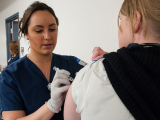"Whenever you do something new it ruffles feathers." That's how Rajesh Prabhu, MD, an infectious disease specialist and the chief patient safety officer with Essentia Health of Duluth, Minn., explained the company's decision to mandate that all healthcare employees, staff, and volunteers get the seasonal flu vaccine this year, a decision that led to dozens being fired.
Employees with any patient contact were required to get vaccinated by Nov 10 or risk termination, which has happened to 50 Essentia employees so far. Now, the union that represents Essentia's nurses, the Minnesota Nurses Association (MNA), is planning to file a formal grievance against the company.
"In no way are nurses against the flu vaccine," said Rick Fuentes, MNA spokesman. "But mandating vaccination is not as effective as voluntary programs."
"We have 13,900 employees," said Maureen Talarico, a media relations specialist with Essentia Health. "Only 50 were let go." Essential manages 15 hospitals and 75 clinics in Minnesota, Idaho, Wisconsin, and North Dakota.
For Prabhu and Talarico, the decision to mandate the flu vaccine as an employment requirement is a crucial step in patient care. People in hospitals, including the elderly, young babies, and the immunocompromised have the most to lose from an influenza infection. Thus, a healthcare worker must do everything in his or her power to not spread the flu.
"The CDC recommends that healthcare workers get vaccinated, and over 640 institutions in the United States have the same policy we do," said Prabhu. He explained that Essentia allows medical and religious exemptions for employees.
Data appear lacking
But Gaston De Serres, MD an epidemiologist at the Institute National de Sante Publique du Quebec, said that mandates like Essentia's are at best misguided attempts at patient protection, and at worst, a rule that's based more on ideology than science.
"I have concern that when you mandate immunization this way, it's as if it were a magic bullet," said De Serres. "A healthcare worker who comes to work when sick is of much greater concern as a danger to patients."
Earlier this year, De Serres co-authored a paper published in PloS One that showed little or no protection was extended to patients when healthcare workers had received flu shots.
"We looked at the evidence. Does immunizing healthcare workers prevent disease in patients?" said De Serres. "What we saw is this evidence is highly questionable."
De Serres and colleagues looked at four randomized control trials assessing the risk of influenza for patients whose providers had been vaccinated. "Although current scientific data are inadequate to support the ethical implementation of enforced [healthcare worker] influenza vaccination, they do not refute approaches to support voluntary vaccination or other more broadly protective practices, such as staying home or masking when acutely ill," the authors concluded.
Mandating other vaccines
Prahbu said that while no "smoking gun" of cause and effect exists when it comes to providers' influenza vaccination status, there are other required immunizations for healthcare workers, including diphtheria, pertussis, and tetanus (Tdap); chickenpox; and the measles, mumps, and rubella (MMR) vaccine.
"Show me proof that having these requirements is protective to patients," said Prahbu. "We see the efficacy of Tdap and MMR dropping over time, and we still mandate it. These immunization policy decisions are done at a higher level than Essentia Health."
But De Serres said comparing the flu vaccine to other vaccination is not helpful. "With flu we have a vaccine that changes every year, we don't have the same duration of immunity and efficacy as other vaccines, many of which are received in childhood."
De Serres said that immunization status does little to protect elderly patients against H3N2 because the vaccine offers only 35% to 40% protection against that strain. And influenza is not the only illness that can cause respiratory sickness in patients.
"If you have a strong policy of vaccinating workers, but you're less stringent about employees working when they are sick, this is not evidence they are putting safety first."
Michael T. Osterholm, PhD, MPH, director of the University of Minnesota's Center for Infectious Disease Research and Policy, publisher of CIDRAP News, agrees with De Serres.
"I'm convinced that taking everyone's temperature before they worked would have more impact in promoting patient safety than mandating the flu shot,” Osterholm said. "If it's a requirement, it's on us to show the data demonstrating that it's useful. We don't have that."
See also:
Jan 27 PLoS One study
Nov 21 Star Tribune story on Essentia firings




















